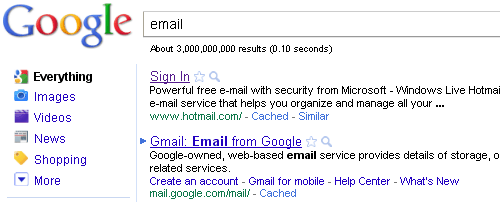2011 has started with Google having to face multiple attacks of self promotion and invasion of privacy from a number of fronts. Claims of bias in Google’s organic search results have risen time and again. The latest one comes from Harvard University.
The accusations have come from a researcher, Ben Edelman, who is an associate professor with the Harvard Business School. He carried out a study titled ‘Measuring Bias In Organic Web Search’. The study was conducted last August along with another Harvard professor, Benjamin Lockwood. A report on the study can be viewed at:
www.benedelman.org/searchbias/
Edelman claims that Google gives much more weight to its own sites and products than is deserved. He also found that Bing search results were more fair and reliable.
For instance, when the term ’email’ was searched, the results gave Gmail as the top-ranked email site, and similarly, YouTube was the highest ranked site for the search term ‘video’.
Google is already facing enquiries by the European Commission and the Attorney General of Texas, regarding claims of manipulation of search results.
Google has strongly refuted the claims made by Edelman, and said, “Mr. Edelman is a longtime paid consultant for Microsoft, so it’s no surprise that he would construct a highly biased test that his sponsor would pass and that Google would fail,”
A spokesperson for the search engine has added, “Google never artificially favours our own services in our organic web search results, and we perform extensive user testing to ensure that search results are ranked in a way that provides users with the most useful answer.”
A number of other websites and bloggers have also spoken in favour of the authenticity of Google results.
Danny Sullivan of Search Engine Land has said, “Statistics can easily be turned to whatever you want them to be. I feel like Edelman is turning his study into the most negative view possible.”
The Huffington Post has also defended Google saying that the study size (32 search terms) is too small a sample. They also add that while favouritism should remain a concern, Google runs on an algorithm, which favours relevant results over irrelevant ones.
One needs to keep in mind the fact that since Google is the market leader with a huge majority, its own sites and products are bound to be more popular than most others and hence deemed more relevant and ranked higher.
While promoting one’s own product is not necessarily a crime, anti-trust commissions in Europe and the U.S.A. might consider this fair grounds for an investigation if someone complain that Google was abusing its dominant position in search to push its own products.
Microsoft had to separate Internet Explorer and Windows Media Player sufficiently from the Windows operating system, as a result of a similar anti-trust investigation. Could Google face a similar fate?








